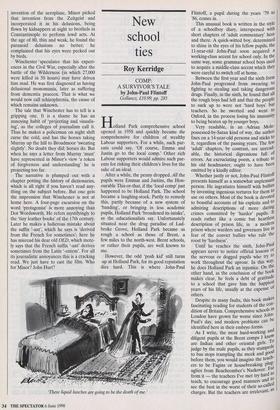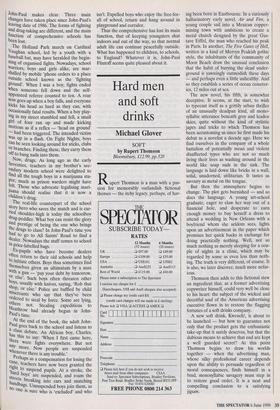New school ties
Roy Kerridge
COMP: A SURVIVOR'S TALE by John-Paul Flintoff Gollancz, £10.99, pp. 285 Holland Park comprehensive school opened in 1958 and quickly became the comprehensive for children of wealthy Labour supporters. For a while, such par- ents could say, 'Of course, Emma and Justin go to the local comp.' Other rich Labour supporters would admire such par- ents for risking their children's lives for the sake of an ideal.
After a while, the penny dropped. All the pupils were Emmas and Justins, the Hon- ourable This-or-that, if the 'local comp' just happened to be Holland Park. The school became a laughing-stock. Partly to remedy this, partly because of a new system of 'banding', or bringing in less academic pupils, Holland Park 'broadened its intake', as the educationalists say. Unfortunately situated near the drug paradise of Lad- broke Grove, Holland Park became as rough a school as those of Brent, a few miles to the north-west. Brent schools, or rather their pupils, are well known to me.
However, the odd 'posh kid' still turns up at Holland Park, for its good reputation dies hard. This is where John-Paul 'These liquid lunches are going to be the death of me.' Flintoff, a pupil during the years '79 to '86, comes in.
This unusual book is written in the style of a schoolboy diary, interspersed with short chapters of 'adult commentary' here and there. A quick-witted boy, determined to shine in the eyes of his fellow pupils, the 11-year-old John-Paul soon acquired a working-class accent for school only. In the same way, some grammar school boys used to acquire a middle-class accent which they were careful to switch off at home.
Between the first year and the sixth font John-Paul progressed from swearing to fighting to stealing and taking dangerous drugs. Finally, in the sixth, he found that all the rough boys had left and that the people to suck up to were not 'hard boys' but teachers. So he swotted and went to Oxford, in the process losing his immunitY to being beaten up by younger boys.
Very readable, in an Adrian Mole- possessed-by-Satan kind of way, the author fixes on a 14-year-old persona and sticks to it, regardless of the passing years. The few 'adult' chapters, by contrast, are unread- able, the historical digressions full of errors. An excruciating poem, a tribute W his old headmaster, ought to have been omitted by a kindly editor. Whether justly or not, John-Paul Flintoff presents himself as a somewhat unpleasant person. He ingratiates himself with bullies by inventing ingenious tortures for them to use on others. Most of the book is devoted to boastful accounts of his exploits and to admiring descriptions of more daring crimes committed by 'harder' pupils. It reads rather like a comic but heartless description of prison life, in a modern prison where warders and governors live in fear of the convict bullies who rule the roost by 'hardness'. Until he reaches the sixth, John-Paul appears never to notice official lessons or the nervous or dogged pupils who trY t° work throughout the uproar. In this way, he does Holland Park an injustice. On the other hand, as the conclusion of the book makes clear, he feels a debt of gratitude to a school that gave him the happiest, years of his life, usually at the expense 01 others.
Despite its many faults, this book makes fascinating reading for students of the con. - dition of Britain. Comprehensive schools Lii London have grown far worse since John" Paul's day, and modern problems can be identified here in their embryo forms. As I write, the most hard-working an diligent pupils at the Brent comps I know are Indian and other oriental girls. T° judge by the male pupils, as they stampede, to bus stops trampling the meek and goo° before them, you would imagine the teach- ers to be Fagins or housebreaking Plug-: uglies from Beachcomber's Narkover. Far from it — the teachers I've met try hard to teach, to encourage good manners and to. see the best in the worst of their so-ca/Jed_ charges. But the teachers are irrelevant, as John-Paul makes clear. Three main Changes have taken place since John-Paul's leaving date of 1986. The forms of fighting and drug-taking are different, and the main function of comprehensive schools has been lost.
The Holland Park march on Cardinal Vaughan school, led by a youth with a baseball bat, may have heralded the begin- ning of organised fights. Nowadays, school warriors, boys and girls alike, are mar- shalled by mobile 'phone orders to a place outside school known as the 'fighting ground'. When I was a boy, fights ended When someone fell down and the self- appointed referee counted to ten. A roar now goes up when a boy falls, and everyone kicks his head as hard as they can, with occasionally fatal results. When a boy play- lag in my street stumbled and fell, a small girl of four ran up and made kicking motions as if a reflex — 'head on ground' — had been triggered. The intended victim Was up in a flash. On Fight Nights, boys can be seen looking around for sticks, clubs or branches. Finding these, they carry them off to bang nails into them. Now, drugs. As long ago as the early Seventies, teachers in my brother's sec- ondary modern school were delighted to find all the tough boys in a marijuana stu- por, much as prison warders might have felt. Those who advocate legalising mari- juana should realise that it is now a children's drug. The real-life counterpart of the school story hero who saves the match and is car- ried shoulder-high is today the schoolboy drug-peddler. What boy can resist the glory and Prestige of being the one who brings the drugs to class? In John-Paul's time you had to go to All Saints' Road to find a dealer. Nowadays the stuff comes to school in price-labelled bags. Ex-pupils who have become dealers often return to their old schools and help initiate others. Boys thus sometimes find themselves given an ultimatum by a man with a gun — 'pay your debt by tomorrow, or else'. Such boys often threaten other boys, usually with knives, saying, 'Rob that shop, or else.' Police are baffled by child miscreants who say that they've been ordered to steal by force. Some are lying, Others not. Stealing expeditions to Heathrow had already begun in John- Paul's time. At the end of the book, the adult John- Paul goes back to the school and listens to a class debate. An African boy, Charles, has this to say: 'When I first came here, there were fights everywhere. But not anY more. Now people are suspended whenever there is any trouble.' Perhaps as a compensation for losing the cane, teachers have now been granted the right to suspend pupils. At a stroke, the hard boys' are suspended, and roam the streets breaking into cars and snatching handbags. Unsuspended boys join them, as no one is sure who is 'excluded' and who isn't. Expelled boys who enjoy the free-for- all of school, return and hang around in playground and corridor.
Thus the comprehensive has lost its main function, that of keeping youngsters shut indoors and out of the way, so that normal adult life can continue peacefully outside. What has happened to children, to schools, to England? Whatever it is, John-Paul Flintoff seems quite pleased about it.



























































 Previous page
Previous page